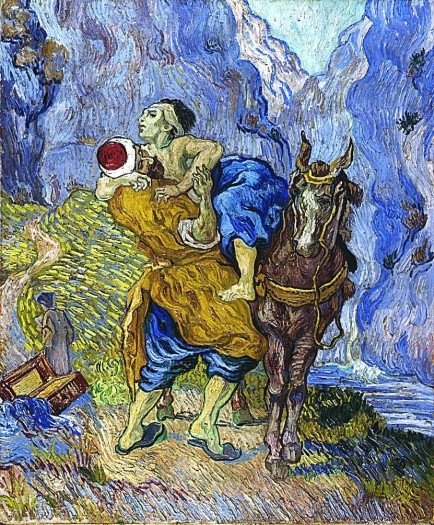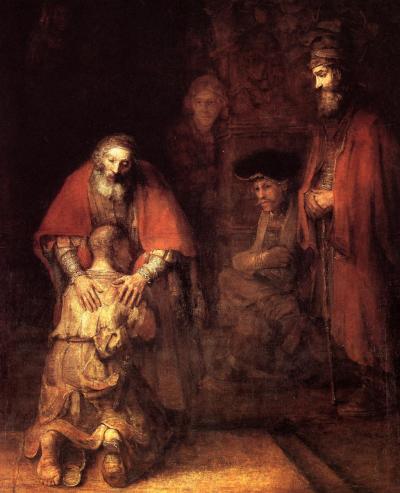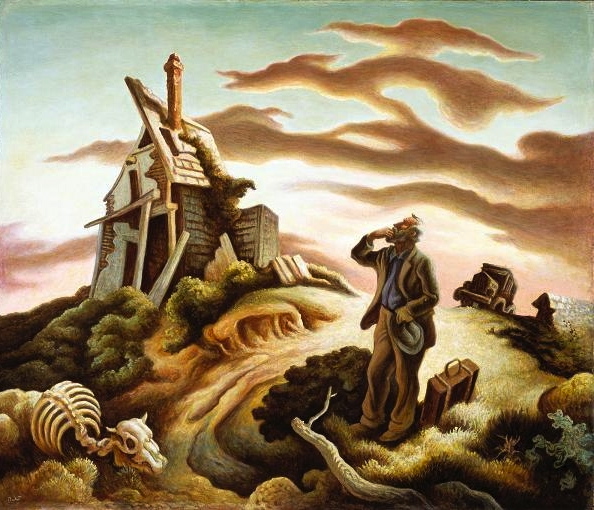 Parables
Parables Entries in Parables (30)
The Parable of the Father
 Saturday, May 5, 2012 at 12:02AM
Saturday, May 5, 2012 at 12:02AM  Sarah Bessey writes at www.sarahbessey.com, where she has become an accidental grassroots voice for postmodern and emerging women in the Church on issues from mothering to politics and theology to ecclesiology. Her writing has been well received in many publications including ChurchLeaders.com, Relevant Magazine, A Deeper Story, SheLoves Magazine, and Emergent Village. Sarah also works with Mercy Ministries of Canada, a non-profit residential home for women seeking freedom from life-controlling issues. She is a happy-clappy follower of Jesus and social justice wannabe. Sarah lives in Abbotsford, British Columbia, Canada with her husband, Brian, and their three tinies: Anne, Joseph and Evelynn Joan.
Sarah Bessey writes at www.sarahbessey.com, where she has become an accidental grassroots voice for postmodern and emerging women in the Church on issues from mothering to politics and theology to ecclesiology. Her writing has been well received in many publications including ChurchLeaders.com, Relevant Magazine, A Deeper Story, SheLoves Magazine, and Emergent Village. Sarah also works with Mercy Ministries of Canada, a non-profit residential home for women seeking freedom from life-controlling issues. She is a happy-clappy follower of Jesus and social justice wannabe. Sarah lives in Abbotsford, British Columbia, Canada with her husband, Brian, and their three tinies: Anne, Joseph and Evelynn Joan.
I'm also proud to call her my cyber-pal.
We call my Dad "El-Sha-Dad, The Dad of More Than Enough."
It's a (hopefully not too blasphemous) joke based on one of the names of God from the Bible, El-Shaddai, the God of More Than Enough. My sister started it as a lark, a way to make fun of how he provided for us, but now it's funny because it's so true. My Dad is an incredibly generous man, he loves us fiercely, and because of this, it's been easy for me to see God as a loving Father, my way was made easier because he walked ahead of me. Growing up, I was secure in the knowledge of two things: first, we cheer for the Boston Bruins come hell or high water or Harry Sinden, and, second, no matter what, my Dad loved me, always had loved me, always would love me, world without end, amen.
I think that's why I always read the Parable of the Prodigal Son a bit differently than most. I mean, I absolutely see myself in the Prodigal Son. We've all taken our inheritance and squandered it horribly. We've all regretted our choices. We've all run away from the ones that love us best. We've all longed to go home. And I also see myself in the Older Brother, too. After all, my standing as a know-it-all is legend in our clan and, like most people that grew up in church, I've confused my work, my right opinions and doctrine, for love and relationship with God.
But even so, for me, this parable is, always has been, always will be about the Father.
The Father that let his son go. The Father that provided for him, even in his sin, in a way that defies logic and reason and parenting manuals. The Father that threw a feast for a broken and defiant rebel. The Father that tried to pull a sulky older brother into the celebration. The Father that has already given everything he had to his children. The Father that celebrated and stocked a party, that welcomed without qualification or expectation of obedience, that didn't bother to hear excuses or reasons before kissing and dancing.
It's the Father's story, really.
I have profoundly disappointed my dad. I have made choices that devastated him. When I stank of slop and lies and wrong choices, legalism and big hairy opinions of how I would do it better than him, there was a realization that my Dad would forgive me. He would forgive me because it was his very nature to love me. He couldn't stop loving me for a moment, no matter how I screwed up, because he had learned to love well at the feet of Jesus. His heart so resembles what I imagine as the heart of Jesus that he carries the scent of a father's grace wherever he walks through my life.
So when I read this parable, even now, today, I cry. I cry every time because I see my Dad in that story. I see my Dad as the Father, running down the road to me, sandals flapping, robe billowing, arms outstretched, half-laughing and half-sobbing, just so happy to see me, to hold me, to love me.
I think sometimes that I'm living in a parable. I don't know really what all it means, but it feels like a story I want to tell, I want people to find God. It makes me want to blaze a path to God for my own tinies, I want to be clear picture for their hearts, a small foretaste of the crazy, unrestrained, unconditional love that they can enjoy in our God, so that when they rebel or turn up their nose or stumble or disappoint, that they know I'll be on the road, that God is already on the road, watching for them when they are still a long way off. I want to have ears to hear and eyes to see what God is showing me. And there is something there, in my Dad, that whispers to me of my Father, of your Father, that truly he's yearning only to hold you, to welcome you, to be with you, to love you, he's already watching for you from a long way off.
Parables, Realized
 Saturday, April 21, 2012 at 11:17AM
Saturday, April 21, 2012 at 11:17AM 
vanGogh: Good Samaritan (c. 1890)
And behold, a lawyer stood up to put him to the test, saying, “Teacher, what shall I do to inherit eternal life?” He said to him, “What is written in the Law? How do you read it?” And he answered, “You shall love the Lord your God with all your heart and with all your soul and with all your strength and with all your mind, and your neighbor as yourself.” And he said to him, “You have answered correctly; do this, and you will live.”
But he, desiring to justify himself, said to Jesus, “And who is my neighbor?” Jesus replied, “A man was going down from Jerusalem to Jericho, and he fell among robbers, who stripped him and beat him and departed, leaving him half dead . . .
It's inspired: Jesus refuses to use the scripture as a rule-book. Instead he lets the word of God fund his imagination. The Lord is doing more than telling us a story, he is showing us how to interact with the Law.
Rembrandt: Return of the Prodigal Son (c. 1667)
Now the tax collectors and sinners were all drawing near to hear him. And the Pharisees and the scribes grumbled, saying, “This man receives sinners and eats with them.”
So he told them this parable:
“There was a man who had two sons . . . “
Who settles disputes by telling a fairy tale? The smartest guy in the room, that's who.

Thomas Hart Benton's The Prodigal is a Midrash on canvas: what it the family could not survive without the younger son? What if he returned too late?
What about you? Is there a painting that moves your heart or reveals more of God's word to you? Leave us a link!
The Parable of Sleeping Ugly
 Saturday, April 14, 2012 at 12:02AM
Saturday, April 14, 2012 at 12:02AM 
My friend Jamie Stilson believes in the power of Ugly, by which he means we learn to take off our religious masks and stand naked before God. Ugly will liberate us from false spirituality and is a celebration of the beauty of God’s grace reflected through our weaknesses, not our strengths. I hope you will find him as ugly as I do, because in him God's grace shines through. Everyone should own a copy of his book, The Power of Ugly. Jamie blogs here and tweets here.
As I write this it is Holy Saturday, the day in-between the cross and the resurrection, the day of waiting, the day of disillusionment, it is the day I find myself living in most of the time. Jesus tells a parable that gives us hope and encouragement to celebrate this living in-between. It is a parable that gives us great insight into how the Kingdom works without giving us any answers. The parable I call Ugly Sleeping is found only in Mark’s Gospel, 4:26-29:
“The kingdom of God is as if a man should scatter seed on the ground. He sleeps and rises night and day, and the seed sprouts and grows; he knows not how. The earth produces by itself, first the blade, then the ear, then the full grain in the ear. But when the grain is ripe, at once he puts in the sickle, because the harvest has come.”
Jesus had already spoken parables of the Kingdom being like sowing a seed, but in this parable he gives us the secret knowledge of how it works. We love to understand how things work so we feel like we are more in control; we love the how to messages that fill in the blanks with the knowledge we need to be happy and a little holy. But in this parable Jesus explains how the Kingdom works when the seed is sown by telling us “the seeds sprouts and grows though the sower does not know how.” You may say that is not an explanation but a mystery--and you’d be right. How the Kingdom works is beyond our understanding but it does work. Can you live with that? I am very cautious about anyone who is an expert about how God works. The longer I walk with Jesus the less certain I am. The more I learn about the Kingdom the less I really understand. This is ugly theology but trust transforms it into beautiful childlike faith.
In essence Jesus tells us that after we have done our part by sowing in faith all we can do is to go to bed! The alternative which I often select is to stay up striving, worrying, fearing, and some faithless praying. One of the best examples in my life would be the teenage years of our three daughters (you can read more in The Power of Ugly, the chapter called Ugly Parenting). We sowed the seed over and over in our daughters hearts, singing over it, praying for it, crying about it, shouting at it to grow but rarely did we just go to bed in perfect peace knowing that in the hiddenness and silence God was powerfully at work. It is a battle to believe that God’s seed is more powerful than a teenagers rebellion.
Jesus goes on to describe the growth of the seed as producing “all by itself.” The word Mark uses, automato, is only found one other place: in Acts 12:10, where a huge iron gate that is locked “opens for them by itself” so Peter is able to escape from prison. This word is of course where we get our word automatically. Jesus says that the seed needs no help from us, leaving us in a place of humbleness and helplessness. Once we have done our part we must believe that God is faithful to do His. The miracle of resurrection is the basis of our faith for which we wait on Holy Saturday while the “seed is planted.” We will not know how but we will know who is working. Is it enough for us to see no evidence, hear no noise of work going on, to stand helplessly by knowing there is nothing God needs from us and go to bed in peace?
The sower went about his daily life being faithful to his responsibilities knowing that in the unseen, the underground Kingdom was at work ready to break forth at any moment. This hope floods the ordinary moments of life with Kingdom expectations. Free from the need to understand in order to believe and delivered from the false responsibilities of trying to make His seed grow we rest in Him.
In many ways going to sleep is like dying, in fact, the New Testament refers to dead believers as “sleeping.” I am not sure teaching little children the traumatic prayer “now I lay me down to sleep and pray the Lord my soul to keep and if I die before I wake, I pray my soul the Lord to take” is the best way to get this truth across. Jesus teaches us in this parable that one of our greatest acts of faith is going to bed with a complete trust that while we sleep He is working and His kingdom is advancing. In sleep we are completely helpless and totally inactive, depending on Him who never slumbers or sleeps. (Ps.121:4) The seed will sprout all by itself in the miracle of resurrection and we will not know how it happened but we will certainly know Who made it happen. Yes, God is working while we sleep and while we live our ordinary lives, but it is usually unseen and without noise.
To be Kingdom people we must embrace our helplessness, knowing He does not need our help. We should celebrate our ignorance of how His Kingdom works, while we in faith expect the blade to sprout up. Tonight why not try laying your head on the pillow in faith and practice dying? Get some “Ugly Sleep,” knowing God is at work.
Inside Life's Greatest Parable
 Saturday, April 7, 2012 at 12:02AM
Saturday, April 7, 2012 at 12:02AM  “I tell you the truth, unless a kernel of wheat is planted in the soil and dies, it remains alone. But its death will produce many new kernels — a plentiful harvest of new lives.” ~ John 12:24
“I tell you the truth, unless a kernel of wheat is planted in the soil and dies, it remains alone. But its death will produce many new kernels — a plentiful harvest of new lives.” ~ John 12:24
This day -- between death and resurrection -- we find ourselves living in the middle of the greatest parable ever told. It was not told with words. It was enacted by the very Word Itself.
Saturday. We are born of an imperishable seed, but beloved, it does not yet appear what we will be. The seed will burst forth.
Parable of the Unfair God
 Saturday, March 31, 2012 at 12:02AM
Saturday, March 31, 2012 at 12:02AM  Today's guest post comes from Aaron McCarter, pastor of the Vineyard in Maryville, TN. Aaron has been my pal for a number of years. He has an easy-going style: you find yourself at ease immediately. He's very likable. All of these qualities merely draw you in until you realize you're in the presence of a disciple of the King--the kind of person who will not settle for anything less than God's best in your life, or his. He and his wife, Sharon have two kids. He blogs here, tweets here, and follows Jesus pretty much everywhere.
Today's guest post comes from Aaron McCarter, pastor of the Vineyard in Maryville, TN. Aaron has been my pal for a number of years. He has an easy-going style: you find yourself at ease immediately. He's very likable. All of these qualities merely draw you in until you realize you're in the presence of a disciple of the King--the kind of person who will not settle for anything less than God's best in your life, or his. He and his wife, Sharon have two kids. He blogs here, tweets here, and follows Jesus pretty much everywhere.
“For the Kingdom of Heaven is like a householder who went out early in the morning to hire laborers for his vineyard. After agreeing with the laborers for a denarius a day, he sent them into his vineyard. And going out about the third hour he saw others standing idle in the marketplace; and to them he said; ‘You, go into the vineyard too, and whatever is right I will give you.’ So they went. Going out again about the sixth hour and the ninth hour, he did the same. And about the eleventh hour he went out and found others standing; and he said to them, ‘Why do you stand here idle all day?’ They said to him, ‘because no one has hired us.’ He said to them, ‘You go into the vineyard, too.’ And when evening came, the owner of the vineyard said to his steward, ‘Call the laborers, and pay them their wages, beginning with the last, up to the first.’ And when those hired about the eleventh hour came, each of them received a denarius. Now when the first came, they thought they would receive more; but each of them also received a denarius. And on receiving it they grumbled at the householder, saying, ‘These last worked only one hour, and you have made them equal to us who have borne the burden of the day, and the scorching heat.’ But he replied to one of them, ‘Friend I am doing you no wrong; did you not agree with me for a denarius?’ Take what belongs to you and go; I choose to give to this last as I give to you. Am I not allowed to do what I choose with what belongs to me? Or do you begrudge my generosity?’ So the last will be first, and the first will be last. (Matthew 20:1-16)
The Parable of the Vineyard runs against the grain of the embedded American psyche, which shouts aloud: “Those who work the hardest, and the longest, earn the greatest reward.” It spits in the face of American capitalism: “What do you mean, ‘Equal pay for all?’ Commies!”
After the owner of the Vineyard pays those workers who had been there all day they glare at him with their sunburned faces, straighten their sore backs so that they could look at him dead in the eye and--like all good Americans--they protest! “You have made them equal to us who have borne the burden of the day and the scorching heat!”
He reminds them that they were paid according to their agreement, and to the others he was simply being generous. “Do you begrudge my generosity?” You bet they do!
The way the men respond to what they are given has everything to do with what they believe they deserve.Those who are met at the back of the line are ecstatic.; those who waited at the front of the line are furious.
This parable tells us a lot about the way we view ourselves...about where we see ourselves in the line. If we saw ourselves as the late-coming wretch who gets more than he ever earned, then this parable wouldn’t leave us with such a bad taste in our mouths. The story sounds a lot different from the end of the line than it does from the front.
How often do you see yourself as the one who got the short end of the stick? As the one who came early and stayed late just for good measure, but still get the same pay as the slouch who didn’t even bother to get out of bed until after lunch?
But it’s entirely possible we are mistaken about where we are in line. In fact, there are all kinds of people ahead of us, people who are far more deserving of God’s love than we’ll ever be. Maybe that’s the case, and maybe it isn’t. But suppose for a moment that it’s you stuck in the back of the line, craning your neck to get just a view of how far line extends ahead of you.
This parable reminds us that life just isn’t fair. And we cringe because it points to the notion that God isn’t fair either. Life isn’t fair, which makes it all the more important that God is. It's especially important in an unjust world that God should be the one authority who plays by the rules—
- who sees to it that people get what they deserve
- who keeps track of how long and how hard we've worked
- who sees to it that people don’t cut line, and everyone gets exactly what they earned.
Life may not be fair, but we think God certainly should be.
But God isn’t fair. For some reason beyond our comprehension, he loves us indiscriminately. For reasons we can’t understand He reverses the order of the line.
If God’s not fair, then there’s a chance that we will get paid more than we are worth; we will be given more than we have earned; we won’t be judged based on our own merit. If God isn’t fair it means he orchestrated the greatest injustice in the history of the world by sending his son to be killed by the very people he had come to save.
God isn’t fair: he’s generous. And if we ever begrudge that generosity we likely have forgotten what a privilege it is to labor in the vineyard, what an honor it is to work on behalf of the vineyard keeper, and there’s are real chance that we’ve forgotten, were it not for God’s grace, where we stand in line.


